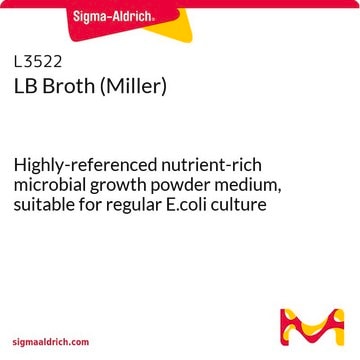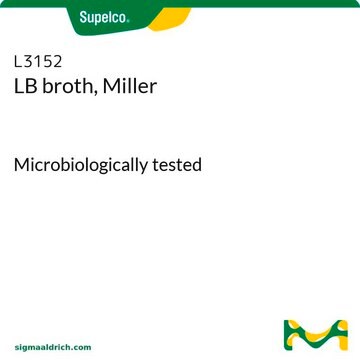L3272
LB Broth with agar (Luria low salt)
Powder microbial growth medium
Synonim(y):
Luria Agar Base (Miller’s Modification)
About This Item
Polecane produkty
klasa czystości
for molecular biology
Poziom jakości
sterylność
non-sterile
Postać
powder
skład
Agar, 15 g/L
NaCl, 0.5 g/L
Tryptone, 10 g/L
Yeast Extract, 5 g/L
metody
microbiological culture: suitable
pH
6.8-7.2(3.05% solution)
Zastosowanie
food and beverages
microbiology
temp. przechowywania
room temp
przydatność
nonselective for Escherichia coli
nonselective for coliforms
Opis ogólny
Zastosowanie
- for culturing E. coli DH10B cells.
- in the isolation of diazotrophic bacteria.
- for transformation of competent E. coli strain Stbl3 for cloning.
Cechy i korzyści
- Easy scale-up using larger package sizes
- A budget-friendly alternative to pre-poured plates
- Standard formulation
Uwaga dotycząca przygotowania
2. Heat to boiling while stirring to dissolve.
3. Autoclave for 15 minutes at 121°C.
4. Cool to 50°C prior to dispensing into petri dishes.
Informacje prawne
produkt powiązany
Kod klasy składowania
11 - Combustible Solids
Klasa zagrożenia wodnego (WGK)
WGK 3
Temperatura zapłonu (°F)
Not applicable
Temperatura zapłonu (°C)
Not applicable
Certyfikaty analizy (CoA)
Poszukaj Certyfikaty analizy (CoA), wpisując numer partii/serii produktów. Numery serii i partii można znaleźć na etykiecie produktu po słowach „seria” lub „partia”.
Masz już ten produkt?
Dokumenty związane z niedawno zakupionymi produktami zostały zamieszczone w Bibliotece dokumentów.
Klienci oglądali również te produkty
Protokoły
General protocols for growth of competent cells in microbial medium.
Hodowla bakterii E. coli w skali od małych kultur do fermentacji. Uwzględniono protokoły inicjowania kultury starterowej, komórek zawiesinowych, monokultury i posiewu bakteriofaga M13.
Nasz zespół naukowców ma doświadczenie we wszystkich obszarach badań, w tym w naukach przyrodniczych, materiałoznawstwie, syntezie chemicznej, chromatografii, analityce i wielu innych dziedzinach.
Skontaktuj się z zespołem ds. pomocy technicznej













